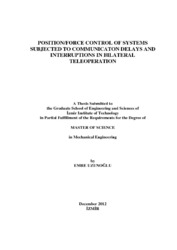Please use this identifier to cite or link to this item:
https://hdl.handle.net/11147/3541Full metadata record
| DC Field | Value | Language |
|---|---|---|
| dc.contributor.advisor | Dede, Mehmet İsmet Can | en |
| dc.contributor.author | Uzunoğlu, Emre | - |
| dc.date.accessioned | 2014-07-22T13:51:46Z | - |
| dc.date.available | 2014-07-22T13:51:46Z | - |
| dc.date.issued | 2012 | en |
| dc.identifier.uri | http://hdl.handle.net/11147/3541 | - |
| dc.description | Thesis (Master)--Izmir Institute of Technology, Mechanical Engineering, Izmir, 2012 | en |
| dc.description | Includes bibliographical references (leaves: 65-68) | en |
| dc.description | Text in English; Abstract: Turkish and English | en |
| dc.description | ix, 76 leaves | en |
| dc.description.abstract | Teleoperation technology allows to remotely operate robotic (slave) systems located in hazardous, risky and distant environments. The human operator sends commands through the controller (master) system to execute the tasks from a distance. The operator is provided with necessary (visual, audio or haptic) feedback to accomplish the mission remotely. In bilateral teleoperation, continuous feedback from the remote environment is generated. Thus, the operator can handle the task as if the operator is in the remote environment relying on the relevant feedback. Since teleoperation deals with systems controlled from a distance, time delays and package losses in transmission of information are present. These communication failures affect the human perception and system stability, and thus, the ability of operator to handle the task successfully. The objective of this thesis is to investigate and develop a control algorithm, which utilizes model mediated teleoperation integrating parallel position/force controllers, to compensate for the instability issues and excessive forcing applied to the environment arising from communication failures. Model mediation technique is extended for three-degrees-of-freedom teleoperation and a parallel position/force controller, impedance controller, is integrated in the control algorithm. The proposed control method is experimentally tested by using Matlab Simulink blocksets for real-time experimentation in which haptic desktop devices, Novint Falcon and Phantom Desktop are configured as master and slave subsystems of the bilateral teleoperation. The results of these tests indicate that the stability and passivity of proposed bilateral teleoperation systems are preserved during constant and variable time delays and data losses while the position and force tracking test results provide acceptable performance with bounded errors. | en |
| dc.language.iso | en | en_US |
| dc.publisher | Izmir Institute of Technology | en |
| dc.rights | info:eu-repo/semantics/openAccess | en_US |
| dc.subject.lcsh | Robots--Control systems | en |
| dc.subject.lcsh | Robotics | en |
| dc.subject.lcsh | Haptic devices | en |
| dc.title | Position / force control of systems subjected to communicaton delays and interruptions in bilateral teleoperation | en_US |
| dc.type | Master Thesis | en_US |
| dc.institutionauthor | Uzunoğlu, Emre | - |
| dc.department | Thesis (Master)--İzmir Institute of Technology, Mechanical Engineering | en_US |
| dc.relation.publicationcategory | Tez | en_US |
| item.languageiso639-1 | en | - |
| item.openairecristype | http://purl.org/coar/resource_type/c_18cf | - |
| item.fulltext | With Fulltext | - |
| item.grantfulltext | open | - |
| item.cerifentitytype | Publications | - |
| item.openairetype | Master Thesis | - |
| crisitem.author.dept | 03.10. Department of Mechanical Engineering | - |
| Appears in Collections: | Master Degree / Yüksek Lisans Tezleri Sürdürülebilir Yeşil Kampüs Koleksiyonu / Sustainable Green Campus Collection | |
Files in This Item:
| File | Description | Size | Format | |
|---|---|---|---|---|
| T001073.pdf | MasterThesis | 3.05 MB | Adobe PDF |  View/Open |
CORE Recommender
Page view(s)
196
checked on Sep 30, 2024
Download(s)
104
checked on Sep 30, 2024
Google ScholarTM
Check
Items in GCRIS Repository are protected by copyright, with all rights reserved, unless otherwise indicated.